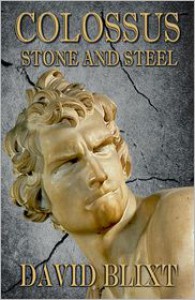Colossus: Stone and Steel
 It is 66 AD when a legion of Roman warriors suffers a catastrophic defeat at Beth Horon; a defeat handed to them by an angry band of Hebrews armed only with slings and spears. The Judean warrior, Judah, also succeeded in taking the Roman eagle which dealt the ultimate blow to the Roman legion. The Judean’s, knowing that Emperor Nero would certainly bring a swift and merciless revenge, must now decide how to protect their lands against the inevitable Roman invasion.
It is 66 AD when a legion of Roman warriors suffers a catastrophic defeat at Beth Horon; a defeat handed to them by an angry band of Hebrews armed only with slings and spears. The Judean warrior, Judah, also succeeded in taking the Roman eagle which dealt the ultimate blow to the Roman legion. The Judean’s, knowing that Emperor Nero would certainly bring a swift and merciless revenge, must now decide how to protect their lands against the inevitable Roman invasion. Colossus: Stone and Steel is a historical fiction about the Roman and Judean war. The war details were intense and gripping. The opening battle sequence, the one at Beth Horon, is vivid and sharp immediately drawing the reader into the action and building a relationship between reader and the characters. The battle scenes may be too much for some readers but they are strikingly accurate and fully necessary to the development of the story. The plot develops outside of the war as well taking place both throughout Judea and in Rome. The story alternates between the Judean preparation for war and the Roman preparations for revenge. Blixt does a great job of alternating between the two perspectives and providing insight into the beliefs and cultural aspects of between the two sects.
Judah ben Matthais begins the story as a simple mason. His brothers are dead, his twin brother Asher believed to be recently perished at war, his father dying of a stroke and Judah’s request for the hand of his beloved Deborah has been denied yet again. All hope for a happy life seems lost when Judah throws himself into the tumultuous action at Beth Horon. His bravery during the battle, and his capture of the Roman eagle, has him declared the hero of Beth Horon. A simple mason soon finds himself in the midst of war fighting alongside priests, revolutionaries, generals and nobles. The character development of Judah is the highlight of the book. All of the characters are well-scripted but Judah rises above all others as the best character in the novel. The others – Levi, Yosef and others that won’t be mentioned due to the possibility of unveiling spoilers – are all multi-dimensional and complex.
The issue with this book is the amount of errors, misspellings and omitted words. For example, at one point it is written that, “…sister had died just recently died.” and at another, “but Titus knew she was the moment the dinner was finished, she and her father would…” and at yet another, “…noting the neighborhood they were entering entered.” There isn’t an overwhelming large number of errors but the errors that are present are glaring and disrupt the flow of the storytelling. These errors are the only real flaws in the book. This review is based upon the Kindle version of the book and therefore statements regarding the typography errors may not be applicable to print versions or later releases.
In the end, Colossus: Stone and Steel is a great historical fiction and one that is recommended for readers who enjoy a brutally accurate depiction of the Roman-Judean war. While this novel does relate to the Judaism and there is mention of the Lord in relation to the Lord’s protection, valor, favor and guidance it is not to be considered a Christian fiction or certainly does not preach faith to the reader. It captures and presents a time period and a specific moment in history rather than pushing religion. It is the story of a culture fighting for their own protection and honor. Overall, a great novel.
Review by Ashley LaMar
Closed the Cover




